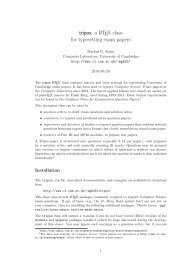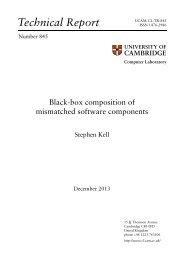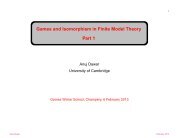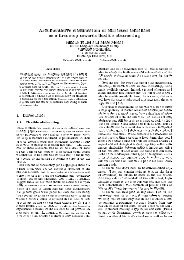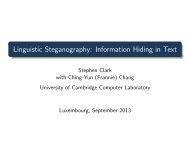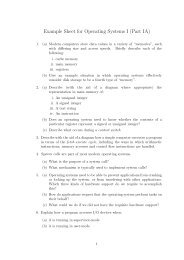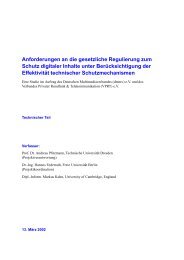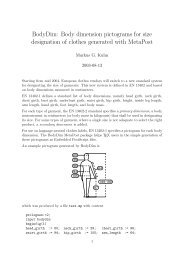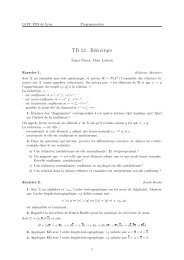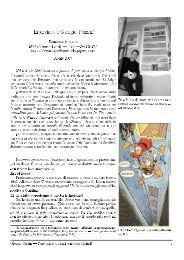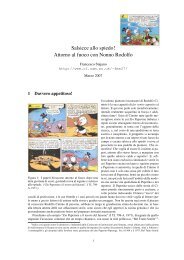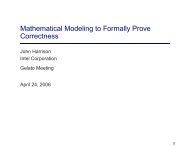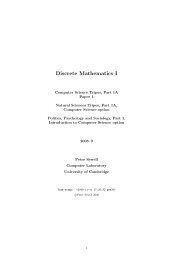Radical innovation: crossing knowledge boundaries with ...
Radical innovation: crossing knowledge boundaries with ...
Radical innovation: crossing knowledge boundaries with ...
Create successful ePaper yourself
Turn your PDF publications into a flip-book with our unique Google optimized e-Paper software.
6.5. Reflective practitioners<br />
Reflection is a critical element of good interdisciplinary practice. However, demand<br />
for constant activity and rapid response to organisational or business demands can<br />
prevent personal reflection. It can be extremely valuable to dedicate some resources<br />
of an interdisciplinary project or enterprise very specifically to reflective<br />
investigation, for example engaging ethnographers to study and re-describe<br />
objectives, activities and outcomes.<br />
This is an organizational corollary of the approach to professional life advocated by<br />
architect Donald Schön, (1983) in which an essential component of professional life is<br />
the ability not only to act <strong>with</strong> professional competence, but to work reflexively in<br />
considering the reasons, nature and consequences of those actions. The reflective<br />
practitioner perspective has spread far beyond the domain of architecture, and is<br />
particularly well-known in public service professions in the UK such as education and<br />
nursing. In the interdisciplinary context, explicit energy devoted to reflection is even<br />
more critical for both the organization and the individual, because of the likelihood<br />
that the work has developed new <strong>knowledge</strong> outside of previously codified<br />
professional practice or organizational processes.<br />
6.6. Obstacles to the interdisciplinary career<br />
Normal professional careers rely on means of establishing prestige and authority via<br />
structures of the professional <strong>knowledge</strong> elites. We must contrast this ‘normal’ way of<br />
pursuing a career <strong>with</strong> the serious career concerns faced by interdisciplinary<br />
academics. Many of our expert witnesses and sources repeatedly expressed concerns<br />
about their career prospects, and there is ample evidence that interdisciplinary work is<br />
bad for academic career advancement.<br />
For early career academics, to be seen to be an interdisciplinary practitioner can be<br />
damaging to their career prospects. While at graduate level <strong>with</strong>in the humanities and<br />
social sciences it is not unusual to encounter problem-led approaches to research<br />
questions, selling oneself on the academic job market post-PhD requires a degree of<br />
specialisation. The established disciplinary structures and domains of <strong>knowledge</strong><br />
<strong>with</strong>in the university system perpetuate these career structures and means of career<br />
advancement. In particular, if a discipline is defined by a formal curriculum that<br />
should be taught to new students entering that discipline, then qualification to teach<br />
that curriculum is largely determined by whether a potential recruit has previously<br />
studied the same curriculum. The maintenance of a disciplinary curriculum therefore<br />
prevents career mobility for interdisciplinary academics.<br />
In particular, although there is ample funding for interdisciplinary research to be<br />
carried out by early career researchers in post-doctoral appointments, those<br />
researchers expect eventually to be appointed to tenured teaching posts. If such posts<br />
are closed to them because they do not have specific curriculum experience, this<br />
results in an oversupply of skilled researchers unable to find permanent jobs.<br />
Innovation and Interdisciplinarity 70



